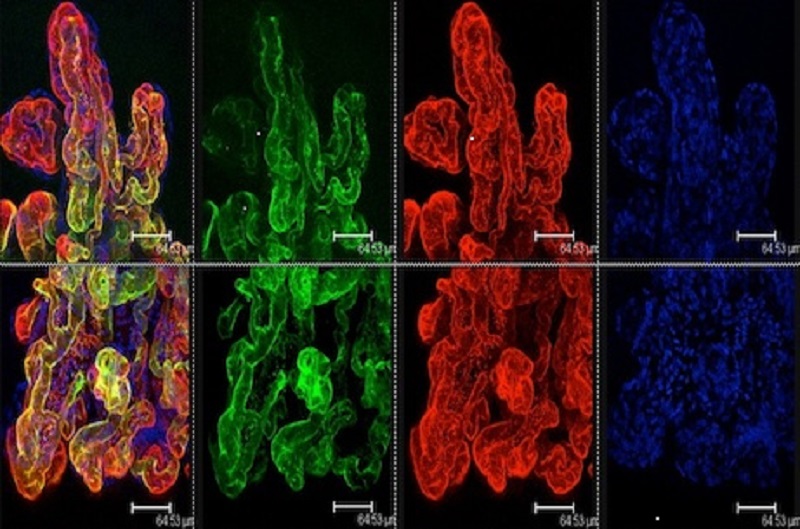
Said Saab's research is looking at ways to improve newborn health.
Said Saab’s [2012] research looks at improving breathing in newborns.
“When babies are born prematurely their lungs are deficient in surfactant, the fluid which is essential for them to breath properly. While this can be given synthetically, our work is looking at how to improve an already existing clinical surfactant preparation,” says Said.
He has already been accepted to do his PhD at Cambridge, which will focus on identifying biomarkers for small for gestation babies. For this he will draw on data from the Pregnancy Outcome Prediction Study, which enrolled and tracked close to 5,000 women throughout their pregnancy. “Now that we know which women had small for gestational age babies, we can compare them to those that did not and identify predictive factors with the hope of being able to intervene earlier in future cases,” he states.
Cuba
Said has always wanted to be a doctor. In Cuba, where he was born and lived until he was 10, he was fascinated by medicine. “I used to help my grandmother with her vitamin B injections and enjoyed preparing the family’s glass syringe when I needed penicillin treatment,” he says. “As I child I always liked the idea of having access to a world that children were not allowed into. As children were not allowed on the hospital wards in Cuba, my parents frequently tried to sneak me in when someone they knew had been hospitalised, but they always got caught.”
Said, whose heritage is part Palestinian on his father’s side, was born in Havana. In 1998, when he was 10, his mother and stepfather won a visa lottery to leave Cuba and go to the US. Said’s half sister and her mother were living in Miami and the family stayed there for two weeks before opting to move to Atlanta. “My parents felt Miami was like Cuba, but with resources; they were worried we would not learn English and integrate if we stayed there.”
In Cuba, Said’s mother, who had a master’s in marketing, was an accountant for a car rental firm. His stepfather worked for a foreign corporation. When they got to Atlanta they both worked for a supermarket while they improved their English. His mother now works at a primary school as the parent liaison for Spanish-speaking families and his stepfather is now a warehouse manager for Del Monte.
For the first three years at school in the US, Said was on the English for Speakers of Other Languages Programme, but by 10th grade he had moved onto the gifted and talented programme and by 11th and 12th grade he was taking advanced placement classes, including English. He performed particularly well in biological science and enjoyed taking part in the Science Olympiad, winning medals at state level for the Forensic Science and Sounds of Music events.
Emory
After graduating from high school, Said started as a biology major at Emory University. Having played in his high school’s orchestra for four years, he intended to double major in music because of his love for the cello, but instead took music as a minor while playing in the Emory Symphony Orchestra. By the second semester, he had transferred his major to neuroscience and behavioural biology and enrolled to do research in an animal behaviour laboratory with Professor Donna Maney.
“For some time I wanted to be the next David Attenborough,” he says. His thesis looked at understanding the mechanisms through which light controls the reproductive system in birds. “The timing of reproduction in many bird species is guided by environmental cues,” he says. “Some rely on day length, which we could manipulate in the lab to better understand the molecular mechanisms underlying this process.” The research was published in the Journal of Neuroendocrinology, with Said named as first author.
While at Emory, Said, who had done voluntary work in high school, was on the board of the Emory Volunteer Centre. He set up an outings programme at a children’s centre in Atlanta, which allowed parents time to look for work. He was also a resident advisor for three years, a mentor for multiple orientation programmes, and a teacher assistant in chemistry, biology and neuroscience. He was selected to join the prestigious Emory Scholars programme and was elected to Phi Beta Kappa for his academic and extracurricular achievements.
Medical school
After completing his undergraduate degree, Said went to New York University School of Medicine. At NYU he served as co-president of both the Black and Latino Students Association and the Admissions Ambassador programme and co-founded the Geriatrics, Painting and Classical Arts Appreciation clubs. He was a member of the medical school’s honours programme, working under Dr Fritz Francois in the department of medicine to identify genetic predictors of colon pathology in an ethnically diverse colon cancer cohort, a project to which he will return in 2016.
By his third year, he had applied to do a masters at the University of Cambridge in Translational Medicine & Therapeutics. He has already won funding through the Centre for Trophoblast Research Graduate Studentship to do his PhD. After completing it, he intends to finish his medical studies and pursue a residency in obstetrics and gynaecology.
While at Cambridge this year, Said was elected Welfare Officer for the Gates Cambridge Scholars Council. He says: “My social life is very much centred around Gates – it has given me a wonderful and inspiring introduction to Cambridge.”
*Photograph courtesy of Professors Stephen Charnock-Jones and Graham Burton. Immunofluoresence staining of a human placental villus highlighting the trophoblast cells in green and the juxtaposed vascular endothelium in red. Nuclei are stained in blue.












